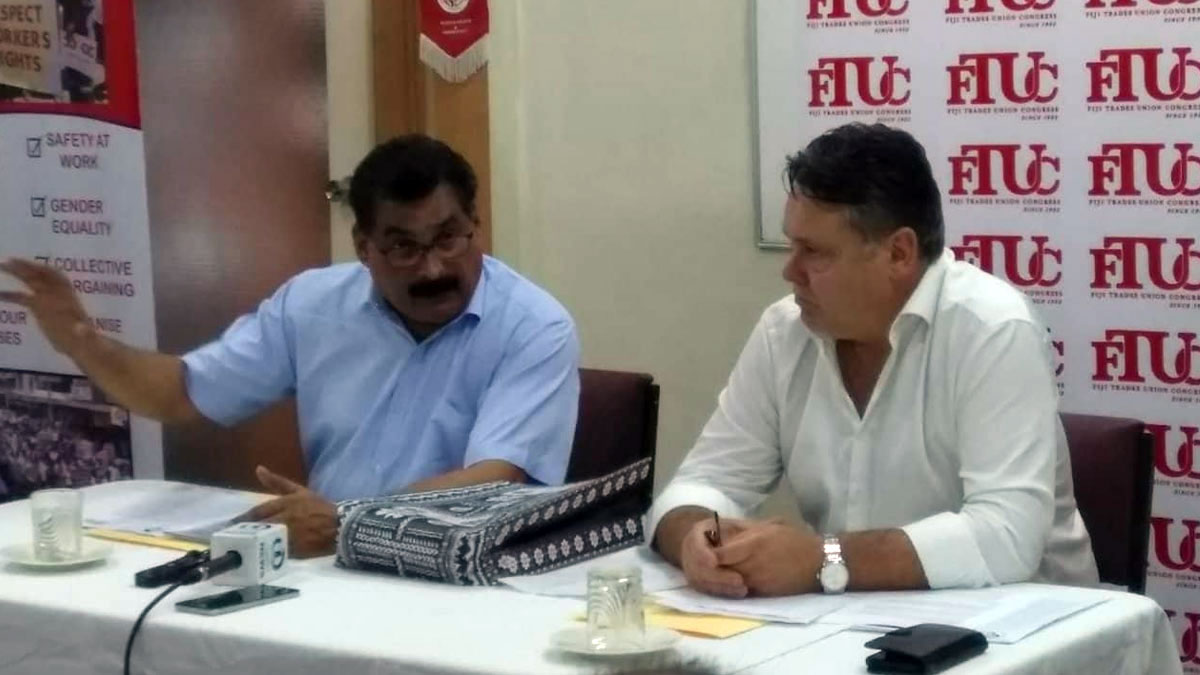
The International Transport Workers’ Federation says it is the voice of 18 million transport workers in every corner of the globe after Attorney General, Aiyaz Sayed-Khaiyum asked who is ITF and questioned their credibility following ITF's recommendation for an urgent and independent review of the Fiji National Provident Fund structure.
The ITF says it is a global union federation of 700 trade unions, representing almost 18 million transport workers in 150 countries.
The ITF further says two weeks ago, they, along with the Fiji Trades Union Congress, raised the question on interference by the government which threatens to undermine the financial stability of FNPF.
General Secretary of ITF, Stephen Cotton says he is also the Chair of the Council of Global Unions and Board Member of the UN Global Compact, an initiative of the United Nations that mobilises industry leaders globally to do business responsibly and improve the state of society.
Cotton says their President, Paddy Crumlin, is Co-Chair of the Committee on Workers Capital, the international body that promotes information sharing and joint action in the field of workers’ capital, the deferred retirement savings of workers.
He says when the ITF speaks, they are speaking on behalf of millions of ordinary working men and women in the transport industry in Fiji and around the world.
Cotton also says they campaign passionately to secure rights, equality and justice for their affiliated unions, and their members.
He also says that is who they are; rather than attacking them for daring to hold their government to account, they implore the Fijian Government to take urgent action to address the questions that have been raised.
The ITF says during pandemic lockdowns, while many people were locked down and able to work remotely from the comfort and safety of their homes, transport workers risked and, in many cases, lost their lives to keep the world moving, getting doctors and nurses to work, keeping food on our shelves, and doing the vital work of delivering vaccines, and if it wasn’t for the sacrifices of transport workers, it is hard to imagine how much worse things could’ve been.
They further say now that the world is gradually returning to normal, it seems like many of those politicians who lauded transport workers as heroes have forgotten who it was that kept society moving.
When we asked Sayed-Khaiyum on ITF's recommendations last week, he also said FNPF had an assessment, an audit by independent auditors who know what they are talking about and an annual report is available for public perusal.
He also says for Fiji Trades Union Congress National Secretary, Felix Anthony to say the funds are depleted, is false.
Sayed-Khaiyum says 70% of member funds are in the preserved accounts, which is only accessible after retirement or when a worker buys or builds a new home.
He also says a few years ago when FNPF lent money to Fiji Airways, the interest rates they got was phenomenal and the loans got paid off.
Sayed-Khaiyum says it seems so ironical when they have to defend a position where credible overseas institutions have given awards to FNPF.
He says the Asian Development Bank is also very impressed with FNPF and its structure after the reforms.
The Minister says Anthony is not known for his sophisticated analysis, is rather krass and gives half information.
He says he doesn’t want to regurgitate on the fee attained by Anthony when he was the FNPF director.
He also says all Fijian governments have had FNPF invest in their bonds.
He adds this is an investment by FNPF, as after purchasing the bonds, they get paid interest rates and this is how they make money and this how it is accredited to workers accounts, 5-6% for the last couple of years and the fund value grows.
The Minister says if FNPF doesn’t buy government bonds, they can make other investments like in hotels and real estate.
He says right from the Ratu Mara government, FNPF has invested in government bonds and nothing has changed.
The new study of FNPF by ITF has recommended worker representatives on the FNPF board of directors, separation of asset investment and management of the fund from the functions of the board of directors, regulations and laws that govern FNPF that stipulates clearly what fiduciary duty means in practise and regulations that stipulate how the interest of members are defined and reviewed in consultation with its members.
ITF Head of Sydney Office, Scott McDine says these funds are not the plaything of a government to prop up its own economic mismanagement, they are the workers fund.
He says it is critically important that the Fijian parliament takes on board the recommendation of the report, thoroughly goes through the report and takes action in regards to the recommendations of the fund to ensure it upholds the obligations for what it was established for.
The Fiji Trades Union Congress says there appears to be little to no transparency in the operations of the fund.
Anthony says when there are 80 percent of members who have balances less than $20,000 in their retirement fund, that is a cause of concern.
Anthony questions if the fund is fulfilling it’s intended role, which is to secure workers retirement.
He says the government has actively encouraged workers to withdraw their own FNPF funds in times of crisis and make it look as if it is government assistance.
He further says the reduction in the FNPF contribution that has been over the last two to three years is not benefiting the workers as employer contribution has reduced to 5% and now up to 6%.
Anthony suggests there should be an independent audit done.
Stay tuned for the latest news on our radio stations

